- Home
- David McCullough
Truman Page 10
Truman Read online
Page 10
The ground was terribly hard so I was having to stop every round to let a three-year-old colt rest. Somebody in the family must have mentioned that I was stopping a lot because about the second day Harry came out and said, “Brownie, I’d keep them going pretty steady.” I was on my third round without stopping when the colt suddenly tumbled over. I called Harry and he came running out very much upset. We got the horse unhitched, into the shade and cooled out, after which Harry turned to me and said, “Brownie, from now on use your own judgment.” And those orders were never changed as long as I worked for Harry.
To more than a few people Harry seemed somehow different. One Grandview resident considered him so neat and polite he was sure Harry must be a preacher. Another, a young woman, remembered how easy he was to talk to. “He was so down-to-earth, yet he was something else, too, even then,” she said.
At threshing time, when neighboring farmers came to help the Trumans, as part of the season’s usual exchange of labor, Harry would work through the morning, but then, just before the big midday meal, while the other men were relaxing, he would clean up quickly and go to the kitchen to help his mother and sister. Stephen Slaughter, youngest of the Slaughter children, would remark that he never saw Harry wearing bib overalls like every other farmer, which seemed to distinguish him. “He always looked neat—not dressed up, but he looked neat. No, no, no, he never wore bib overalls.” Stephen’s first glimpse of Harry was on the morning of a threshing day at the Slaughter farm when Stephen was a small boy. Harry had come swinging into the yard driving one of the wagons, only Harry drove standing up and wore a Panama hat.
His circle was enlarging. After three years on the farm, he joined the Masons. Both grandfathers had been Masons and John Truman, though he never joined, said he always meant to. Harry was elected to receive degrees at the Belton Lodge on January 30, 1909. By March, having become “letter perfect” in the ritual, he passed to Master Mason. He greatly enjoyed the fellowship and took the ritual and spiritual teachings of Freemasonry with extreme seriousness. He felt uplifted by brotherhood in an order claiming great antiquity and to which both Mozart and Andrew Jackson had belonged, as had so many presidents, including Theodore Roosevelt and his recent successor, William Howard Taft. As every Mason knew, George Washington took the oath of office on a Masonic Bible and laid the cornerstone of the Capitol with a Masonic trowel.
In the autumn of 1909, Harry Truman was appointed a deacon. The following year he organized a new lodge at Grandview, in a room over a store on Main Street. By age twenty-six, he was already a figure of importance in the community. “Harry was a very good lodge man,” recalled Gaylon Babcock, a brother Mason, who happened not to be as impressed as were others by Harry’s abilities as a farmer, or by Harry’s personality. To Babcock, Harry seemed more of a “utility man” around the Truman place. Babcock, further, was bothered by the fact that Harry, a grown man, played the piano and still called his mother “Mamma.” Babcock much preferred Vivian or John Truman. Nonetheless, he thought Harry did “a good job in the lodge work—excellent.”
The man primarily responsible for Harry’s involvement in the Masons was Frank Blair, a clerk in the bank at Belton. “Frank Blair got Harry interested…and Harry was, as a bright fellow, ambitious,” Stephen Slaughter remembered. “And he [Harry] had ideas…I’m sure he had ideas…that he might even go into politics.” Stephen’s father, O. V. Slaughter, was president of the Jackson County Farm Bureau, which Harry also joined.
In December of 1909, shortly after her ninety-first birthday, Grandma Young died. Harry, who had been devoted to her, tried to imagine all she had seen in her life. She had been born in 1818. She had once told him of a time when Solomon was away and a band of Indians came to the door saying they wanted honey and hung about sharpening their knives on the grindstone until she turned a big dog loose and sent them flying. In recent years she liked to sit silently in the sunshine in a rocker smoking a corncob pipe. Her death was the first to touch Harry directly. That Christmas without her, he said, was the saddest he had ever known.
By the will of Harriet Louisa Young the farm went to Matt and Harrison, her five other children sharing none of it on the grounds that they had played no part in the work and should consider the money gifts they received over the years as fair compensation. Not surprisingly a storm broke over the will.
Meantime, Harry delighted in the increasingly frequent visits of Uncle Harrison, who came out from Kansas City full of funny stories and eager to beat Harry in a game of double dummy bridge. Uncle Harrison, as Harry came to appreciate, was a “character,” a huge, talkative, profane, generous-spirited man, a kind of Missouri Falstaff who had a splendid time doing—or talking about doing—most of the things one wasn’t supposed to. Certainly he was not like anyone in Grandview. Six feet tall and extremely stout—Harry estimated he weighed 240 pounds—he wore good three-piece suits, a gold watch chain, and always carried lots of cash. He prized the time he spent loafing, loved vaudeville, gambling, and Kansas City women, and thought it time Harry learned a new dance step called the “Pigeon Wing.” He also drank considerably, and asleep on the couch, he could, as Harry noted, set a record for snoring.
All Trumans, Harry decided, were worriers by nature, but Uncle Harrison said he let others do his worrying for him. Uncle Harry was part of Harry’s education, as they both appreciated.
He was filling out, becoming much stronger physically. The time with his father had also brought an important change. Working together in all seasons, they had grown closer than either ever supposed they might. Indeed, John Truman had come to depend on Harry and to respect his judgment. When a horse pulled a beam over on John in the barn, breaking his leg, Harry took charge and ran things for three months, until April of 1911. Then a calf knocked Harry down and broke his left leg below the knee. The attention and kindness showered on him by both parents through the next weeks took him by surprise. “Papa buys me candy and fruit as if I were a two-year-old,” he wrote, “and Mamma spends half her time making me comfortable and making my favorite pies. You really don’t know how much you’re thought of until you get knocked out. I shall try to keep my head though.”
Later in the year, when Vivian was married to Luella Campbell, the daughter of a nearby farmer, and moved off the homeplace, John made Harry a full partner, as once Solomon Young had done for him. If, in a good year, the farm cleared $4,000, then Harry might make as much as $2,000, or twice what he had earned at the bank. But by the same agreement Harry also assumed equal responsibility for John Truman’s debts, which were substantial.
They had new stationery printed for “J. A. Truman and Son, Farmers.” By the standards of the family’s time-honored way of life, not to say the viewpoint of the surrounding community, Harry Truman had arrived. “To be a good farmer in Missouri—that’s tops. That’s the finest thing you can say about a man,” Vivian would declare emphatically a lifetime later. Harry himself, writing in October 1911, summed up generations of bedrock faith in the old Jeffersonian dream of a nation of farmers:
You know as long as a country is one of that kind, people are more independent and make better citizens. When it is made up of factories and large cities it soon becomes depressed and makes classes among people. Every farmer thinks he’s as good as the President or perhaps a little bit better.
This was in a letter, one of many, designed to inform and influence Bessie Wallace of Independence, who knew nothing of farms or farming. For by now Harry was head over heels in love.
III
“Well, I saw her,” he is said to have exclaimed with a grin to the Noland sisters one summer night in 1910.
Ethel and Nellie Noland, who had both become schoolteachers, were still living in the family house on North Delaware Street. According to Ethel, keeper of family history, Harry had stopped for a visit when someone mentioned a cake plate that should be returned to Mrs. Wallace and Harry volunteered “with something approaching the speed of light.” He crossed the street, went
up the walk to the Gates house, up four steps and onto the porch, cranked the bell of the tall, double-leafed front door, then stood waiting. “And Bess came to the door,” remembered Ethel, who must have been watching from her own porch, “and of course nothing could have been a bigger occasion than that, to see her again and talk to her.” He didn’t return for two hours.
From the farm to North Delaware Street was only sixteen miles, but a long ride by horse and buggy—four hours or more round trip—even assuming John Truman would make the horse and buggy available when Harry wished. Nor was going by train much faster or easier. Harry had to walk into Grandview and catch the Frisco to Kansas City, then change to an Independence train. Relatively few trains stopped at Grandview, however, and connections were poor, with long delays even if everything went right. The one other possibility was to hitch a ride by buggy to a point called Dodson on Blue River, where he could take the interurban, the electric streetcar, into Kansas City, then transfer to another streetcar to Independence. Whichever way he chose seemed designed to make life difficult. Yet he made the trip at every opportunity, often spending the night on a couch at the Nolands’. Old friends and relatives in town were greatly impressed by such ardor. To people in Independence, Grandview was “the sticks.”
He was invited to Sunday dinner and sat politely with Bessie and her very formal mother, her brothers, and Grandmother and Grandfather Gates, as a black servant passed dishes. In the parlor afterward he played the piano for them. Bessie also accepted his invitations to concerts and the theater in Kansas City and went with him to meet his former piano teacher, Mrs. White. Harry was sure they would like one another. (“Isn’t she a caution?” he said later of Mrs. White.) Yet Bessie, as others noticed, did not go out to the farm to meet his family.
But it was in letter after letter—hundreds of letters as time passed—that he poured himself out to her, saying what he found he never could in her presence, writing more than he ever had in his life and discovering how much satisfaction there was in writing. He also longed desperately for her to write him, which, as he told her, was the main reason he wrote so often and at such length. Phone calls on a party line were out of the question, with the neighbors listening. He didn’t like the telephone under any circumstances. “I’m always rattled and can never say what I want to,” he explained to her.
What she wrote to him, what tone her correspondence took, can only be imagined, or deduced from what he said in response, since none of her letters from this period has survived.
It was a cheerful, often funny, consistently interesting, extremely alert, straightforward, and irrepressible young man that she came to know in this outpouring of mail from Grandview. And she possessed many of the same qualities. Her vitality and good humor, in particular, had made her quite popular in her own circles. Several young men had found her attractive well before she was rediscovered by Harry Truman. Chrisman Swope, son of one of the wealthiest families in Independence, had come calling frequently. There was a Mr. Young, a Mr. Harris, and a “romance” apparently with a young man named Julian Harvey from Kansas City. As Harry understood from the start, she was used to attention.
He could not spell very well, as he was aware. (“Say, it sure is a grand thing that I have a high school dictionary handy,” he wrote. “I had to look on the back to see how to spell the book itself.”) And clearly he delighted in talking about himself. He was his own favorite subject, yet nearly always with a sense of proportion and a sense of humor. She had never received letters anything like them—and very fortunately she saved them.
It is necessary to sit about half a mile or so from the horses when you drive an old binder [he explained in one] and it’s yell or stand still. My whip is just too short. If I make it longer it grinds up in the machinery and causes a disaster not only to the insides of the binder but to my record in the Book of Justice. It’s cheaper to cuss the team.
“This morning I was helping to dig a grave,” he reported in another letter, attempting to illustrate that farmers “get all kinds of experience in lots of things….”
It is not nearly such a sad proceeding as you’d think. There were six or seven of us, and we’d take turns digging. Those who weren’t digging would sit around and tell lies about the holes they’d dug and the hogs they’d raised. We spent a very pleasant forenoon and then went to the funeral.
They were hardly love letters, no “nonsense or bosh.” He told her about Uncle Harry, about the hired men, and while he bragged occasionally of how hard he worked, he in no way romanticized life on the farm for her benefit. If anything, he went to the other extreme. “I have been to the lot and put about a hundred rings in half as many hogs’ noses. You really haven’t any idea what a soul stirring job it is, especially on a day when the mud is knee deep….” He described being stuck in the eye by a blade of corn, and how his face had burned to the color of raw beef after hauling hay all day.
He had strong opinions and no small share of bigotry, though she never saw it that way, never found his use of expressions like “coon,” “nigger,” “bohunk,” “Dago,” or “Chink” objectionable, or she would have let him know and that would have been the end of it, since as he said, “I’m horribly anxious for you to suffer from an excessively good opinion of me!”
In his way he could also become quite philosophical, a word he didn’t like.
“You know when people can get excited over the ordinary things in life, they live,” he said at one point.
“You’ve no idea how experience teaches sympathy,” he observed in another letter, soon after breaking his leg.
Of his religious convictions, a matter he knew to be of great importance to her mother, he said that while he remembered well their Presbyterian Sunday School days together and though he had since joined the Baptist Church, he was only a reasonably good Baptist as the term was understood in Grandview. “I am by religion like everything else. I think there’s more in acting than in talking.” Bessie had invited him to attend an Episcopal service in Independence. (The Wallaces, too, had abandoned the Presbyterian Church.) It was his first time at an Episcopal service, he told her. He knew nothing of “Lent and such things.” Once, on a Sunday in Kansas City, he confessed, “I made a start for church and landed at the Shubert.”
They exchanged views on writers. Mark Twain was his patron saint in literature, Harry said. The year before, as he did not tell her, he had spent $25 of his own money for a twenty-five-volume set of Twain’s works. She urged him to read the longer novels of Dickens and in a letter written in May 1911, after his accident, he told her that to his surprise he was greatly enjoying David Copperfield:
I have been reading David Copperfield and have really found out that I couldn’t appreciate Dickens before. I have only read Oliver Twist and Tale of Two Cities. They didn’t make much of an impression on me and I never read anything else. A neighbor sent me Dombey & Son and David C., and I am glad for it has awakened a new interest. It is almost a reconciliation to having my leg broken to contemplate the amount of reading I am going to do this summer. I am getting better fast and I am afraid I’ll get well so soon I won’t get to read enough…. I do think Mr. Micawber is the killingest person I have run across in any book anywhere. He is exactly true to life. I know a half-dozen of him right here in Grandview. They are always waiting for something to turn up….
Then, out of the blue, that June, he proposed to her by mail, mixing affection with a little self-deprecation and caution, fearful she might laugh at him.
You know, were I an Italian or a poet I would commence and use all the luscious language of two continents. I am not either but only a kind of good-for-nothing American farmer. I’ve always had a sneakin’ notion that some day maybe I’d amount to something. I doubt it now though like everything. It is a family failing of ours to be poor financiers. I am blest that way. Still that doesn’t keep me from having always thought that you were all that a girl could be possibly and impossibly. You may not have guessed it but I’v
e been crazy about you ever since we went to Sunday school together. But I never had the nerve to think you’d even look at me…. You said you were tired of these kind of stories in books so I am trying one from real life. I guess it sounds funny to you, but you must bear in mind that this is my first experience in this line and also it is very real to me.
Three weeks passed without a word from her. He waited, agonizing, then wrote to ask if he had said anything to offend her. She responded by turning him down, and apparently over the phone. That same day he wrote as follows:
Grandview, Mo.
July 12, 1911
Dear Bessie:
You know that you turned me down so easy that I am almost happy anyway. I never was fool enough to think that a girl like you could ever care for a fellow like me but I couldn’t help telling you how I felt. I have always wanted you to have some fine, rich-looking man, but I know that if ever I got the chance I’d tell you how I felt even if I didn’t even get to say another word to you. What makes me feel good is that you were good enough to answer me seriously and not make fun of me anyway. You know when a fellow tells a girl all his heart and she makes a joke of it I suppose it would be the awfullest feeling in the world. You see I never had any desire to say such things to anyone else. All my girlfriends think I am a cheerful idiot and a confirmed old bach. They really don’t know the reason nor ever will. I have been so afraid you were not even going to let me be your good friend. To be even in that class is something.
You may think I’ll get over it as all boys do. I guess I am something of a freak myself. I really never had any desire to make love to a girl just for the fun of it, and you have always been the reason. I have never met a girl in my life that you were not the first to be compared with her, to see wherein she was lacking and she always was.

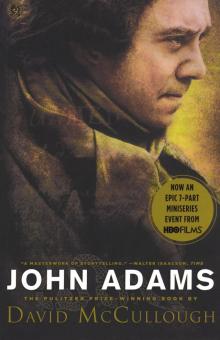 John Adams
John Adams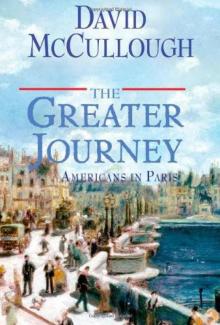 The Greater Journey: Americans in Paris
The Greater Journey: Americans in Paris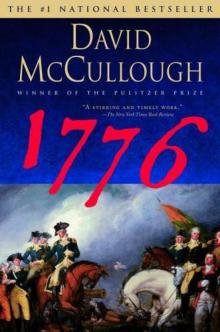 1776
1776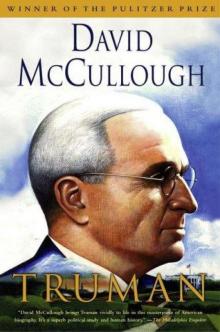 Truman
Truman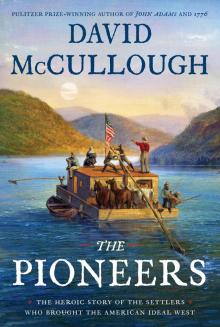 The Pioneers
The Pioneers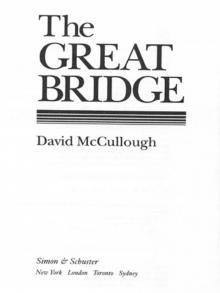 The Great Bridge: The Epic Story of the Building of the Brooklyn Bridge
The Great Bridge: The Epic Story of the Building of the Brooklyn Bridge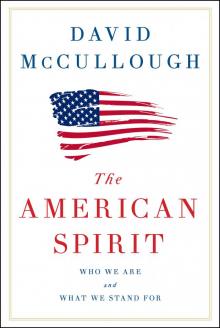 The American Spirit
The American Spirit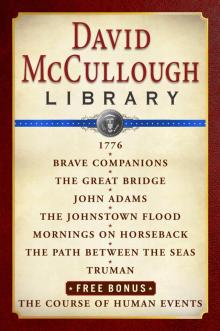 David McCullough Library E-book Box Set
David McCullough Library E-book Box Set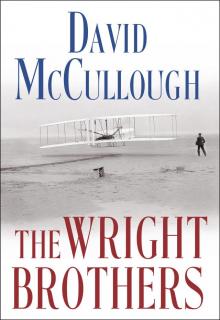 The Wright Brothers
The Wright Brothers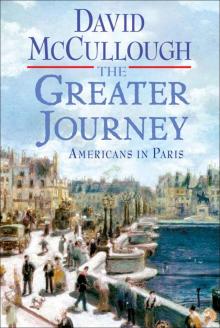 The Greater Journey
The Greater Journey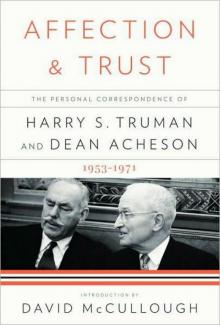 Affection and Trust: The Personal Correspondence of Harry S. Truman and Dean Acheson, 1953-1971
Affection and Trust: The Personal Correspondence of Harry S. Truman and Dean Acheson, 1953-1971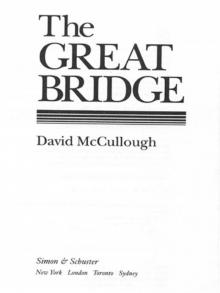 The Great Bridge
The Great Bridge